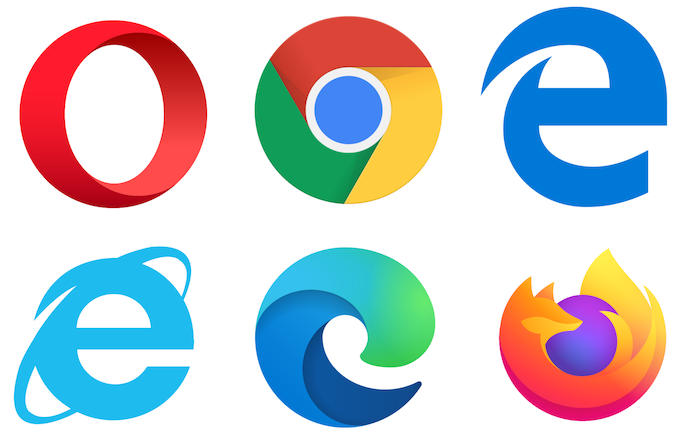The 2020 Browser Battle: Surfing With Speed
by Brett Howse on September 10, 2020 8:00 AM EST- Posted in
- Software
- Browsers
- Mozilla
- Google Chrome
- Microsoft Edge

Accessing the internet is one of the most basic tasks for any computer, but webpages in 2020 are incredibly complex so how the browser interprets the code and renders it as a viewable webpage is no simple task. Modern browsers have both a rendering or layout engine, as well as a scripting engine, and both factor into how well the browser can handle any particular task.
When the web first evolved, it was more or less a static affair, with webpages laid out in HyperText Markup Language, otherwise known as HTML, but as time passed websites became more and more complex, with it not uncommon today to run applications that would have been compiled programs several years ago. As such, browser performance is still an especially important metric for any PC user.
For 2020, the browser landscape has been shaken again, with Microsoft abandoning their closed source browser and moving over to the open source Chromium project, which as the name suggests, is the basis for the popular Google Chrome browser. After being in development for over a year, Microsoft has started updating Windows 10 PCs from Edge based on EdgeHTML to the Chromium Edge. As such, we figured it was a good chance to take stock of the browser landscape and see how some of the more popular browsers fare in terms of performance and battery life.
Although the web is based on HTML, with a standards body approving changes to the base HTML and therefore a level playing field, over the years it has never worked out quite as well as hoped, with web developers focusing on particular browsers that are popular or they are comfortable with, so over the years we have seen quite a few periods where specific browsers have been favored over others. Most readers will likely remember the days of Microsoft’s Internet Explorer 6 dominance, where websites would often only work in IE 6 thanks to heavy use of ActiveX. Internet Explorer has been a dominant feature of business and enterprise intranet sites, to the point where Microsoft is still forced to include and update their ancient browser even as they would like to move on. But that was certainly not the only time that has happened. Microsoft had the shoe on the other foot with the rise of mobile computing, where Webkit was the predominant browser thanks to Apple’s Safari browser on iOS, and Google using Webkit as the basis for Chrome as well.
What this means is that the web landscape, despite being open thanks to a standards body, has never felt as open as it could have been. One dominant platform or another has tended to be the one to drive developers to utilize new features that may not yet be ratified as web standards, or not yet supported by other browsers. So, although there is likely a group of people happy to see Microsoft abandon their own browser engine and move to Chromium, for the web it is not necessarily a net positive to see so much consolidation.
Today’s web landscape heavily favors browsers based on Chromium, which of course includes Google Chrome, but also the new Microsoft Edge, as well as Opera, Vivaldi, Brave, and quite a few more. Mozilla Firefox is the rare exception, with Mozilla developing their own browser engine in Gecko with Spidermonkey for scripting. Apple continues to offer Safari with Webkit, of which Chromium forked into Blink back in 2012.
| 2020 Web Browser Comparison | |||||
| Name | Rendering Engine | Scripting Engine | Version Tested | ||
| Google Chrome | Blink | V8 | 84 | ||
| Microsoft Edge Classic | EdgeHTML | Chakra | 18 | ||
| Microsoft Edge Chromium | Blink | V8 | 85 | ||
| Mozilla Firefox | Gecko | SpiderMonkey | 79 | ||
| Opera | Blink | V8 | 70 | ||
| Internet Explorer | Trident | Chakra (JScript) | 11 | ||
| Apple Safari | WebCore | JavaScriptCore | Not Tested | ||
Although each browser has their own advantages in terms of features, design, and privacy, today we are going to just focus on how each browser performs. When an application is run on your desktop, most of the time it is going to be code that is written, then compiled. On the web, the code is not compiled, and instead the browser relies on its ECMAScripting engine to perform Just-In-Time (JIT) compilation. Because of this, browser performance is heavily impacted by how that scripting engine performs. We have seen advances in the scripting engine improve browser performance over time, as well as sometimes finding degradation as the engine is updated. And, of course, from time to time we have seen various vendors add specific code to deal with popular scripting benchmarks of the day.
The other side of the equation is battery life, meaning how efficient the browser and scripting engine is. The decline of the desktop has been happening for years with laptop sales continually outpacing desktops, so more battery life from your browser is likely a welcome addition.
For this test, we will be focusing on some of the more popular browsers available on the PC. As more of them consolidate around Chromium, we figured it was a good chance to look at how each browser performs, as well as look at the outgoing Microsoft Edge and even Internet Explorer to see if Microsoft has had to sacrifice performance during this transition.











121 Comments
View All Comments
Tomatotech - Thursday, September 10, 2020 - link
Poor Fred. How is he nowadays?tipoo - Friday, September 11, 2020 - link
On the street and dried up, apparently.Lezmaka - Thursday, September 10, 2020 - link
I'm guessing Chromium Edge is faster since it's not constantly sending every action to Google.PeachNCream - Thursday, September 10, 2020 - link
Yeah, Google is yet again in legal peril over non-consensual data collection in Chrome. There are lawsuits in Canada and the US over data collection while incognito and data collection without Chrome sign-in. Bottom line is that Google is a disgusting, filthy company with a business model that lives and dies on collecting, compiling, and mining your data across multiple products.Browser performance can climb into the back seat and get in a long line behind concerns about my browser not selling me out to revolting home invaders like Google and the other tech companies that present their products and services as oh-so-beneficial and helpful to me. I'll wait a few seconds for a tab to load if my browser isn't selling me off to the mothership.
eastcoast_pete - Thursday, September 10, 2020 - link
Appreciate that point, especially when running Linux, those can be reasonably snappy. But, as your comment also suggests, I believe those low-end laptops are a good testing platform for which browser is able to stay usable with many tabs open despite limited memory and computing power. Brett's test system is already quite well equipped with both of those, and unlikely to run out of either.sonny73n - Friday, September 11, 2020 - link
You’re spot on about Google. Chrome automatic updates can’t be disabled in Group Policy or changed to manual. Goggle services constantly running in the background probably to collect your data. And when you uninstall Chrome, it would leave traces everywhere all over your system. They’re truly a disgusting and filthy POS. I’m glad that some phones are without Google services.sonny73n - Friday, September 11, 2020 - link
Hey Google, I’m glad that you banned some Chinese manufactures from using your spying services. I’d rather have the Chinese spy on me. You’re the evil with no human decency, moral and ethic. You’re just a low life scum working for the Deep State mafia. Time to get rid of you.Lord of the Bored - Sunday, September 13, 2020 - link
Google didn't ban any chinese manufacturers from using their services. The US government did, and China banned its residents from using several more services because they weren't censored enough and contained factual information that made Emperor Pooh Bear look badimaheadcase - Thursday, September 10, 2020 - link
I never understood the whole best browser, it really just comes down to what you like best. On a normal PC it won't make one difference to a user anymore.heffeque - Thursday, September 10, 2020 - link
For some people it's a matter of which one makes you feel less of a product.Personally I switched back to Firefox after Google did something with Chrome which I very much disagreed with (I don't remember what anymore, but I remember that it was the last straw) and although it has a few quirks here and there (especially the Android's latest version) I'm happy to have done it. Google/Microsoft have too much power regarding the web browsing, and going Firefox is the best way to fight their supremacy.